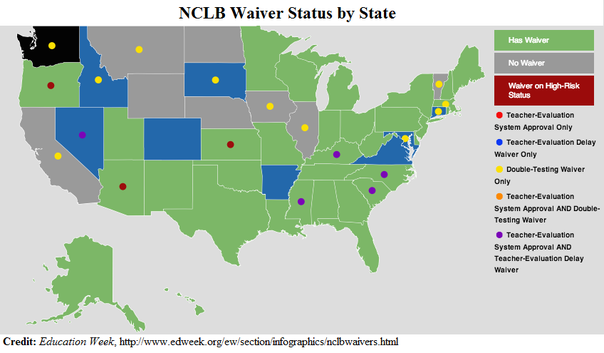 (Click on image to see the original, full-screen version at Education Week.)
(Click on image to see the original, full-screen version at Education Week.) But states with waivers should work with the U.S. Department of Education to renew them. Here’s why:
Currently, the Obama administration doesn’t want to use heavy-handed sanctions against schools, but the politics of waivers will soon change. After the midterm elections, the president becomes a lame duck. Without future elections to worry about, the department of education will have greater political flexibility to aggressively pursue states without waivers.
Most states will have a different experience than California
Many states with waivers hope to emulate California’s waiverless experiment. The state has reported few regrets about losing its waiver, but unique political dynamics make California the exception rather than the rule. California knows it is an unlikely target for sanctions because of its enormous political importance to the Democratic Party. So far, in 2014, Californians have made $100 million in campaign contributions to Democrats, which accounts for more than one-fifth of all contributions (excluding the District of Columbia). Democratic heavyweights like House Minority Leader Nancy Pelosi and Rep. George Miller also represent California. California may currently find itself in a strong negotiating position, but most states will not. Because decisions about waivers are political, conservative states, in particular, will draw the attention of the administration.
Potential sanctions are harsh
The department of education also has one giant weapon remaining in its repertoire: the withholding of education aid. Virtually every district in the country has failed to meet progress benchmarks under No Child Left Behind. Failing to meet those targets provides the education department the authority to withhold funding from every state. Revoking those dollars would force states to comply with the waivers, and states should consider the potential political and budgetary fallout from such a move. The damage associated with losing education aid for the disadvantaged is so large that states must avoid this scenario at all costs.
Freedom from NCLB has its attraction today, but in the not-too-distant future, that may turn out to be an unmitigated disaster for adventurous states.
Josh Bleiberg is a research analyst in the Center for Technology Innovation at the Brookings Institution. Reach him via email or Twitter.

 RSS Feed
RSS Feed